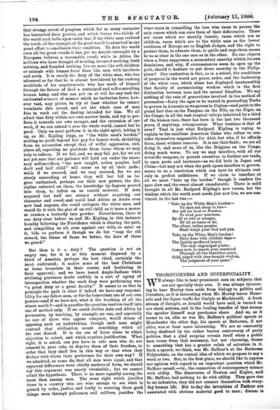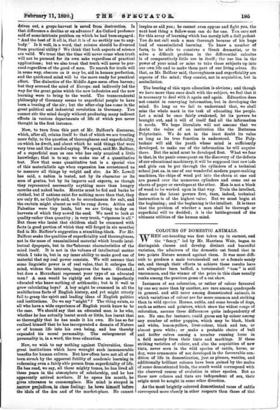THOROUGHNESS AND SUPERFICIALITY.
WE always like to hear prominent men on subjects that are not specially their own. It was always interest- ing to hear Huxley turn aside from biology to politics and literature, as it is interesting when Mr. Morley leaves Home- rule and the liquor traffic for Carlyle or Machiavelli. A fresh stream of thought, as Arnold would have said, is turned on our stock notions, and in the healing benefits of that stream the speaker himself may perchance share. And so, as it seems to us, able as was Mr. Balfour's political speech at Manchester the other day, his speech at Battersea, if not abler, was at least more interesting. We are so constantly being deafened by the rather barren controversy of party politics, that a glad surprise reveals itself when a public man turns from that necessary, but not charming, theme to something that has a greater relish of salvation in it. Such a speech, we think, was Mr. Balfour's at the Battersea Polytechnic, on the central idea of which we propose to say a word or two. But, in the first place, we should like to express our opinion with regard to an important question which Mr. Balfour raised,—viz., the connection of contemporary science with utility. The discoveries of Newton and Kepler, said Mr. Balfour, had nothing to do with utility. They gave the to no industries, they did not connect themselves with every- day human life. But to-day the inventions of Pasteur are associated with obvious material good to man ; disease is driven out, a grape-harvest is saved from destruction. Is that difference a decline or an advance ? An Oxford professor said of some intricate problem on which he had been engaged : " And the best of it all is, that it is of no earthly use to any-
body." Is it well, in a word, that science should be divorced from practical utility ? We think that both aspects of science are valid. We trust that the time will never come when truth will not be pursued for its own sake regardless of practical applications ; but we also trust that truth will never be pur- sued regardless of the good of man. To search for truth will in some way, obscure as it may be, aid in human perfection, and the quickened mind will be the more ready for practical effort. The dialectics of the Middle Ages seem often barren; but they aroused the mind of Europe, and indirectly led the way for the great gains which the new industries and the new learning were to bring to the world. The transcendental philosophy of Germany seems to superficial people to have been a beating of the air ; but the after-clap has come in the great political and industrial revolution in Germany. You cannot stir the mind deeply without producing many indirect effects in various departments of life of which you never thought in the first instance.
Now, to turn from this part of Mr. Balfour's discourse, which, after all, relates itself to that of which we are treating more fully, to the question of thoroughness and superficiality, on which he dwelt, and about which he said things that were very true and that needed saying. We speak, said Mr. Balfour, of a superficial man as one who has only acquired a little knowledge; that is to say, we make use of a quantitative teat. Now that same quantitative test is a special vice of this materialistic age when expansion has accustomed us to measure all things by weight and size. As Mr. Lowell has said, a nation is tested, not by its character or its men of genius, but by its imports and exports, as though they represented necessarily anything more than hungry months and naked backs. Mouths must be fed and backs be clothed, but if nations exist for nothing more than that, they are only fit, as Carlyle said, to be succedaneum for salt, and the curtain might almost as well be rung down. Attica and Palestine were tiny lands, but we are living to-day on harvests of which they sowed the seed. We need to look at quality rather than quantity ; in very truth, "ripeness is all." But those who insist that children shall be crammed with facts (a good portion of which they will forget in six months) find in Mr. Balfour's suggestion a stumbling-block. For Mr. Balfour seeks the qualities of superficiality and thoroughness, not in the mass of unassimilated material which breeds intel- lectual dyspepsia, but in the-Inherent characteristics of the mind itself. It is not in the volume of intellectual matter which I take in, but in my inner ability to make good use of material that my real power consists. We will assume that some linguistic power is of real value, that it enlarges the mind, widens the interests, improves the taste. Granted ; but does a Mezzofanti represent your type of an educated man ? A man would be rightly set down as imperfectly educated who knew nothing of arithmetic; but is it well to grow calculating boys? A boy might be crammed in all the multifarious facts of English history, and yet might utterly fail to grasp the spirit and leading ideas of English politics and institutions. Do we say " might " ? The thing exists, as all who have a wide experience of English youth know to be the case. We should say that an educated man is he who, whether he has actually learnt much or little, has learnt that so thoroughly that he has made it his own. He has so far realised himself that he has incorporated a domain of Nature or of human life into his own being, and has thereby expanded his moral personality. The enlargement of personality is, in a word, the true education.
Now, we wish to say nothing against Universities, those great institutions which have wrought such immeasurable benefits for human culture. But how often have not all of us been struck by the apparent futility of academic learning in redeeming even a fairly able person from superficiality of life. He has read, we say, all those mighty tomes, he has lived all these years in the atmosphere of scholarship, and he has apparently arrived nowhere. If he opens his mouth, he gives utterance to commonplace. His mind is steeped in narrow prejudices, in class feeling; he bows himself before the idols of the den and of the market-place. He cannot
inspire or aid you; he cannot even oppose and fight you, the next best thing a fellow-man can do for one. You care not for this array of learning which has merely left a dull pedant You do not call such a man thorough because of his huge load of unassimilated learning. To know a number of facts, to be able to construe a Greek dramatist, or to solve a difficult problem in the differential calculus is of comparatively little use in itself ; the use lies in the power of your mind or mine to take these subjects up into our own life and to make them part of our living selves. So that, as Mr. Balfour said, thoroughness and superficiality are aspects of the mind; they consist, not in acquisition, but in assimilation.
The bearing of this upon education is obvious ; and though we have more than once dealt with the subject, we feel that it is necessary to deal with it again and again. Education does not consist in conveying information, but in developing the mind. So long as we fail to understand that, we shall miss the whole mark in the task of educating the people. Let a mind be once fairly awakened, let its powers be brought out, and it will of itself find all the information it needs. We hope literalists will not assume that we doubt the value of an institution like the Battersea Polytechnic. We do not in the least doubt its value so long as its true function is understood. The Poly- technic will aid the youth whose mind is sufficiently developed, to make use of the information he will acquire there. But the mind must be developed first. What we fear is that., in the panic consequent on the discovery of the defects of our educational machinery, it will be supposed that raw lads and girls can be put through the cylinders of a technical school just as, in one of our wonderful modern paper-making machines, the chips of wood put into the churn at one end are passed over the numerous cylinders and come out as sheets of paper or envelopes at the other. Man is not a block of wood to be worked upon in that way. Train the intellect, draw out the latent powers first, then, indeed, technical instruction is of the highest value. But we must begin at the beginning ; and the beginning is the intellect. It is there that the problem of whether a man shall be thorough or superficial will be decided ; it is the battle-ground of the ultimate utilities of the human mind.







































 Previous page
Previous page